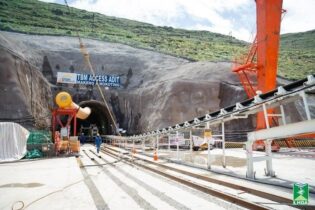Raubex, an integrated road construction and rehabilitation company, has acquired bitumen producer Tosas Holdings from Sasol Oil for R120 million in cash.
This forms part of Raubex’s long-term strategy to become more vertically integrated and to also become a supplier along the entire road construction value chain. The acquisition became effective in April 2013. The acquisition provides Raubex with several bitumen processing and storage facilities in inland regions of South Africa and a significant footprint in both Namibia and Botswana. Tosas’s assets included bitumen processing and storage facilities in Germiston, Bloemfontein, Worcester, Cape Town, Vryburg, Namibia and Botswana. Rudolf Fourie, the chief executive of Raubex, reports that the transaction includes all of Tosas’s assets and properties, as well as its 168 employees and a five-year agreement with Sasol to supply bitumen, which is primarily used for road construction activities. The acquisition follows Raubex’s confirmation in November that it was investing R21 million in storage facilities for asphalt to cushion it from bitumen shortages in the country. The transaction will significantly boost Raubex’s turnover. Tosas posted revenue of R750 million last year. With the persistent bitumen supply shortages in South Africa, this acquisition also secures Raubex’s long-term bitumen supply and adds storage facilities, which are critical to ensure efficiencies around the necessary imports of bitumen. It is estimated that Tosas will now service in the region of 50% of Raubex’s own bitumen needs. As Tosas previously has the capacity to supply 100 000 tpy of bitumen, half of which is required by Raubex, it will continue to supply value-added bituminous products to the external market and provide Raubex with the ability to “modify” bitumen in-house.Modified bitumen includes rubber or synthetic latex and is a more elastic and durable product with greater temperature stability.
“We want to make sure we provide the whole value chain of road construction – that is our business, ”explains Fourie. He says in the past Raubex had bought 50% of its bitumen from oil companies, and another 50% from suppliers of modified bitumen. These included Tosas and Colas SA, a maker of bituminous binders and slurries for road surfacing. “The other main reason is because of the bitumen crisis in the country, it secures our supply,” he maintains. Persistent bitumen shortages have seen a rise in imports in recent years. Raubex had brought in product from both Singapore and Spain. Fouriesays South Africa’s major oil producers were turning away from bitumen production, mainly because of breakdowns in ageing plants and due to plant maintenance costs. Instead they were now focusing on making and distributing diesel, petrol and kerosene. “Bitumen is probably at the end of that food chain,”Fourie points out. He says companies needed storage facilities for the product and that Raubex now owned these, including for storing imported bitumen. “To avoid the repeat of the chaos that followed the shortage of bitumen in 2011, this acquisition is a good move by Raubex. If Raubex produces its own bitumen, it means that it will have control over the supply of the product, compared with a situation where a third party controls the product,” maintains Fourie.






